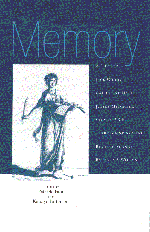Book contents
- Frontmatter
- Contents
- Introduction
- 1 Disturbing Memories
- 2 ‘Turning a Blind Eye’: Memories of Empire
- 3 Memory and the Making of Fiction
- 4 Memory in Oral Tradition
- 5 Memory and Psychoanalysis
- 6 When Memory Fails
- 7 How Brains Make Memories
- 8 Memory and Neural Networks
- Notes on Contributors
- Acknowledgements
- Index
5 - Memory and Psychoanalysis
Published online by Cambridge University Press: 05 June 2012
- Frontmatter
- Contents
- Introduction
- 1 Disturbing Memories
- 2 ‘Turning a Blind Eye’: Memories of Empire
- 3 Memory and the Making of Fiction
- 4 Memory in Oral Tradition
- 5 Memory and Psychoanalysis
- 6 When Memory Fails
- 7 How Brains Make Memories
- 8 Memory and Neural Networks
- Notes on Contributors
- Acknowledgements
- Index
Summary
Although she came to see me as an analytical patient five times a week, Miss A. found it very difficult to remember anything from one session to the next. Shortly after we had met and started working together, she had told me that she needed me to remember why she had gone into a shoe shop. It was not like going into a grocer's and forgetting the sugar – anyone could do that; she did not even know why she was in the shoe shop. She added, somewhat embarrassed by what she had said, that she did not need me to know it too well, that would be absolutely awful.
Mr B., on the other hand, had an excellent memory and prided himself on recalling what I had said more accurately than I did. But one day when I mentioned something it turned out he had forgotten, he snapped at me, ‘How can you expect me to remember that when I can't even remember my own mother from one day to the next?’ Mr B.'s widowed mother needed his daily attention. Mr B. had a particular memory of childhood that was probably what we call a ‘screen’ memory – a mixture of experience and highly relevant fantasy, like a dream image. In this mnemic image he was standing shaking out a tarpaulin sheet together with his father, a DIY enthusiast: he could see the garden, himself, his hands on the tarpaulin, the tarpaulin held at both ends shaking, and then the image stopped.
- Type
- Chapter
- Information
- Memory , pp. 95 - 112Publisher: Cambridge University PressPrint publication year: 1998
- 1
- Cited by



